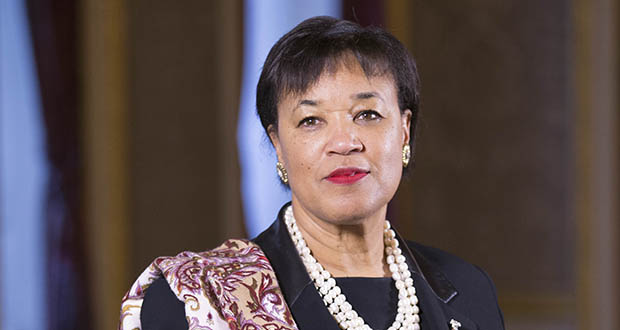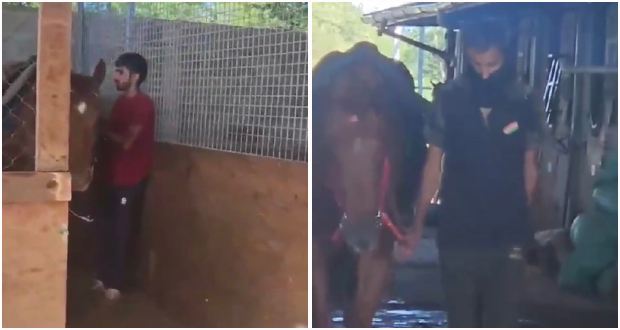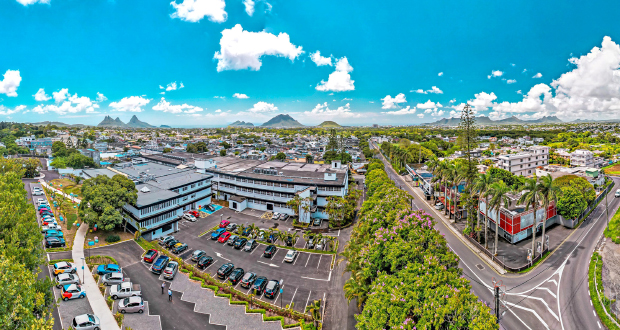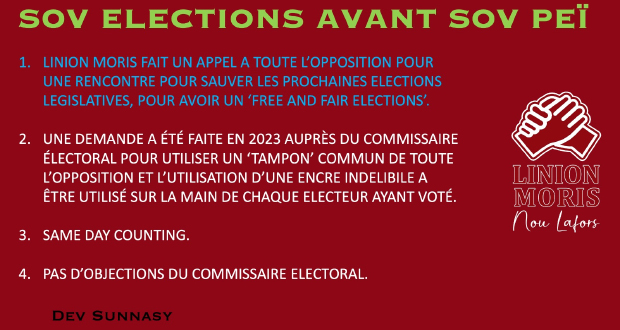Publicité
The Commonwealth Secretary-General: “Over US$ 500 million worth of climate change projects for island states”
Par
Partager cet article
The Commonwealth Secretary-General: “Over US$ 500 million worth of climate change projects for island states”

Trade ministers of member countries of the Commonwealth met in London on the 10th of October. What was the purpose of this meeting?
The Commonwealth Trade Ministers Meeting brings together policy shapers and decision-makers from all our 53 member countries to discuss pressing trade issues and find common ground where they can collaborate and support each other in order to enhance trade and by doing so to develop their economies. We are seeing worrying trends around the world, including rising protectionism, escalating trade tensions, while the multilateral trading system, with the World Trade Organisation at its core is being threatened. This directly affects the lives and livelihoods of the 2.4 billion people who live in our member countries.
By bringing together Commonwealth Trade Ministers to plan and act in coordinated ways, and in particular to build on the “Commonwealth Advantage” (see below), we are able to mobilise and provide leadership towards resolving trade tensions and build in positive ways towards more inclusive prosperity in which all can share.
It is the 6th Annual Commonwealth Trade Ministers meeting…
Yes, this is only the 6th time a meeting of this sort on trade has been convened since the Commonwealth, as we know it today, was created seventy years ago. It follows the Commonwealth Heads of Government Meeting (CHOGM) in April 2018, which was also chaired and hosted by the United Kingdom, when leaders collectively committed to the ambitious and inspiring goal of increasing trade among Commonwealth member countries to US$ 2 trillion by 2030.
They also launched the Commonwealth Connectivity Agenda, which is a comprehensive strategy to support economic growth, job creation and sustainable development, with a focus on five key thematic areas: physical, digital, regulatory, supply side and business-to-business connectivity. This week, ministers discussed tangible and practical ways to deepen trade and investment through this Connectivity Agenda, within the context of working towards a more open, fair, transparent and inclusive multilateral trading system.
How can members of the Commonwealth take better advantage of this group for trade?
The Commonwealth offers immense opportunities for collaboration on trade. Intra- Commonwealth trade in goods alone has increased by around US$ 100 billion over the past three years, reaching almost US$ 450 billion in 2018. Combined trade in goods and services is projected to grow from around US$ 560 billion in 2016 and reach US$ 700 billion by 2020. Rapid growth in both population and per capita income, particularly in our developing country members, notably in Asia, is contributing to this encouraging upward trajectory. Moreover, with more than 60% of the combined Commonwealth population of 2.4 billion younger than 30, these trends are likely to continue for a considerable time.
Our member nations are also able to capitalise on what is known as “Commonwealth Advantage”. This is the product of a combination of factors including the depth of historical ties, a common language, similar legislative, governance and administrative systems based on the common law, and dynamic diaspora communities driving enterprise and investment. As a result, trade costs between Commonwealth country pairs are on average 19% lower than comparable non-Commonwealth counterparts. And our member states also invest, on average, 10% more and trade 20% more with each other than they do with non-members.
Is there a distinctive feature of Commonwealth cooperation?
Members of the Commonwealth can leverage these advantages and work together for the common good. A distinctive feature of Commonwealth cooperation is that within the remarkable diversity and geographical range of our family of nations, which includes some of the wealthiest and largest economies, as well as some of the smallest and most vulnerable members,there is a clear sense of unity around the values and principles of our Commonwealth Charter.
Within the context of international dialogue on trades, the spirit of goodwill and consensus for which Commonwealth discussions are noted helps to make them practical, cooperative and solutions-oriented. We operate on the basis of trust rather than of treaty.
You said that the 2030 goal is to achieve US$ 2 trillion worth of trade within the Commonwealth. But what kind of goods and services will be traded?
Each Commonwealth country trades goods and services at which they have a comparative advantage over other countries. They produce and trade everything from agricultural products and textiles to automobiles and oil, all of which are needed to feed, clothe, house and connect people around the world. They also trade services in telecommunications, finance, tourism and business sectors.
Market fluctuations and changing consumer trends mean that countries have to diversify their products and services in order to thrive and to add value to what they produce. For example, small island states that rely on agricultural products such as coconut may need to tap into other parts of the global value chain value by exporting value-added products like virgin coconut oil rather than relying simply on exporting copra. It is on areas such as this that our member countries are now able to cooperate under the Commonwealth Connectivity Agenda.
We are already seeing an expansion in what our member countries can trade digitally and this is a trend that will strengthen over coming years. Digital transformation is already occurring in many Commonwealth economies, bringing unprecedented opportunities and also presenting fresh challenges. In order to capitalise on this, we are cooperating to narrow the digital divide in the Commonwealth.
You are talking about Digital transformation. So, what about the Internet access rate in Commonwealth countries?
On average, 85% of the population in high-income Commonwealth countries have access to Internet, compared to only 18% in our low-income members. Women tend to be disadvantaged by a “double digital divide”, particularly in Least Developed Countries where they are on average 14% less likely to own a mobile phone than men, and also 31% less likely than men to be connected to the Internet. Achieving full access to broadband could add up to US$ 1 trillion to the combined GDP of Commonwealth countries.
What will be the new role of the Commonwealth countries after Brexit?
Brexit mainly concerns one of our member countries, the United Kingdom (UK). But, of course, it is important for all to keep abreast of developments, as many Commonwealth developing countries depend heavily on the UK market for their exports of specific goods and services. The implications for these countries will depend on the nature of the UK departure from the EU and what kind of future trading arrangements are set in place. A no-deal Brexit will mean the UK trades with its partners under World Trade Organization (WTO) rules, while it has also sought to roll-over existing Free Trade Agreements to which it is party in order to minimise trade disruption. The UK has also stated it will extend duty-free access for goods to Least Developed Countries, as it currently does under the EU’s Everything But Arms scheme.
What about the drawbacks for the member states of the Commonwealth when talking of a no-deal Brexit?
In the event of a no-deal Brexit, our first concern is for our most vulnerable members and to ensure that whatever the outcome, they will be able to continue to trade without interruption or adverse impact. Indeed, our Commonwealth focus would be on working towards there being beneficial consequences, and the Commonwealth Secretariat has been working with these members to diversify the supply chains in which they participate. Our research shows that the strong connections between the UK and Commonwealth developing countries are likely to act as a buffer against any negative effects from a possible slowdown in the UK economy post-Brexit. In short, the UK’s contribution and its relationship with these countries through these sectors are expected to remain strong.
And what will happen post-Brexit?
Post-Brexit, the Commonwealth will still have two members within the European Union: Malta and Cyprus. Their commitment to the Commonwealth remains strong, with Cyprus currently the chair of governing board of the Commonwealth Secretariat and Malta a member of the Commonwealth Troika, having hosted CHOGM in 2015 and therefore the immediate past Chair-in-Office of the Commonwealth. It is also the host for our Commonwealth Small State Centre of Excellence and the Commonwealth Trade Finance Facility.
The Commonwealth Secretariat and the European Commission have a long history of working together. We have been working jointly across Africa, the Caribbean and the Pacific (ACP) for over 10 years to support countries with negotiating trade agreements and we will continue to work together. All ACP countries, the EU and UK have an interest in ensuring that specific measures are taken post-Brexit to ensure the continued smooth functioning of complex supply chains which have developed over recent decades.
In the event of Brexit, will new trade agreements with the UK have to be done with each member country (those that currently trade with the UK within a European framework)?
With or without a deal with the EU, the UK has sought to roll-over existing Free Trade Agreements to which it is party in order to minimise trade disruption. These are referred to as “continuity agreements”, and seek to preserve current terms and conditions of market access. Mauritius is party to one such continuity agreement (because of its membership to the Eastern and Southern Africa Economic Partnership Agreement). This reproduces tariff schedules close to the EU’s and therefore maintains the preference on key export sectors such as fisheries, textiles and clothing and sugar for the time being. How the UK’s schedule may evolve in the future and potential options to improve rules of origin are areas which Mauritius will wish to monitor closely.
The fight to stop climate change is an issue mostly for the small island states. Will the funding from the Commonwealth to these countries be revised?
In the Commonwealth, we would certainly not see climate change itself or action to tackle climate change as being issues only for small island states. However, we do recognise the small island nations are in the front line and bear disproportionately the adverse impact of climate change, which is why we have to work with them to build their resilience and capacity to adapt.
We now know from the scientific findings of the Intergovernmental Panel on Climate Change that failure to limit the increase of global average temperature to well below 2.0 degrees from pre-industrial levels will result in catastrophic and irreversible climatic impact. We also know that this goal cannot be achieved without very significant reductions in the historically high emissions of developed and industrialised nations.
So, the commitment of industrialised nations is critical not only in cutting emissions, but also in providing technological and financial assistance to the small island nations to fight prevailing and future impact of climate change. In the Commonwealth, we are providing specially targeted support on climate change to our small island member nations through a range of mechanisms. On the finance front, the Commonwealth Climate Finance Access Hub, which is based in Mauritius, is the principal facility through which we are assisting these countries with building their institutional capacity and resilience and by mobilising finance.
How much has been mobilised to finance climate change so far?
In a short span of time, the Climate Finance Access Hub has made some remarkable progress. With the generous financial support received from Governments of Australia, the UK and, of course, Mauritius, the hub has now extended its programme to ten countries and already mobilised over US$ 27 million of climate finance. Over US$ 500 million worth of climate change projects are applied for and in the pipeline.
Publicité
Les plus récents






